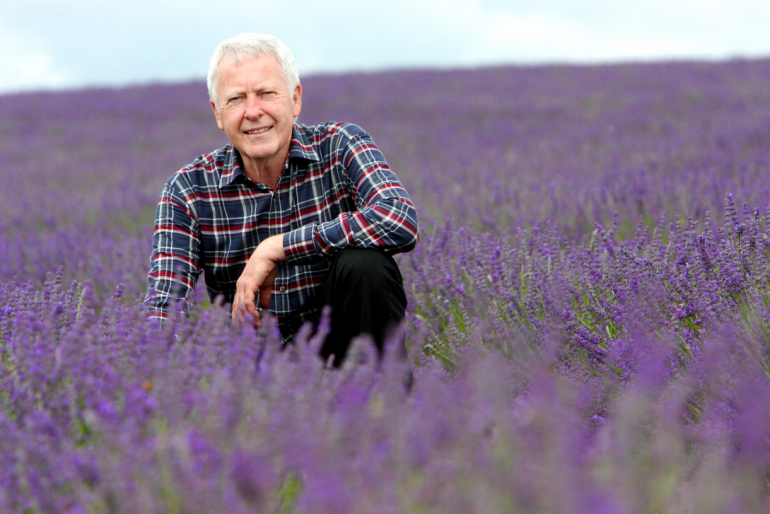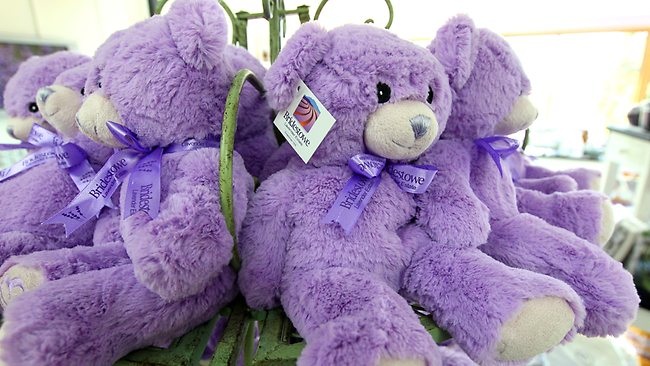How Bobbie the bear became a Chinese sensation
Robert Ravens, a retired industrial chemist of four decades, owns one of the most famous bears in China: Bobbie. The bear is a cute purple teddy filled with dried lavender flowers from his Bridestowe estate in Tasmania. The estate has turned into a pilgrimage site for Bobbie’s fans across Asia.
However, when Ravens bought the run-down estate in 2007, he never envisaged his 265-acre farm would become a tourism mecca. “It was not taken on as a commercial proposition -- it was a restoration project,” he told Family Business.
“It was like buying an old Rolls Royce and doing a restoration job.”

Before it became famous for its bear, Bridestowe was internationally renowned for its leading technology and practice in distilling essential oil. “It became a laboratory for the rest of the world,” he said, “Every modern essential oil distillation plant is designed on the basis of the technology developed at Bridestowe estate.”
However, the lavender farm fell into disrepair after a change in ownership. Ravens set out to restore the former glory of the estate and sank a lot of money into improving its agricultural health.
When Ravens started working on the farm, he found a lot of dried lavender flowers in storage that no one could find an effective use for. With that in mind, he started thinking about designing a product that could make use of the excess dried lavender.
The answer was a teddy bear stuffed with dried flowers. “We developed the bear about seven years ago and it was designed specifically to use dry lavender flowers. We were looking for ways to add value to dry flowers,” he said.
Bobbie was popular from the beginning, selling a few hundred a month to mostly domestic tourists. However, a famous Hong Kong chef changed the fate of the bear when he heard about the estate. The chef was photographed in the field, which happened to be in full flower, playing with Bobbie.
Boom, the image was beamed back to Hong Kong. Before everyone knew what was happening, Cathay Pacific and Virgin pilots and cabin crews were flocking to the shop in Sydney that sells Bobbie. Sales of the bears skyrocketed, from a few hundred a month to a few thousand a month.
Want more Family Business stories like this? Sign up for our free weekly newsletter
Bobbie’s new popularity took Ravens by surprise. “We never intended it for the international market. It wasn’t the target market,” he said, “we changed the whole approach.” Ravens marked in his calendar January 2011 as the first historical milestone for the bear.
So Bobbie became a starlet in Hong Kong. But he was not yet a superstar.
That happened when a second Chinese visitor, who happened to be a famous actor from Shanghai, saw Bobbie in Hobart. He was impressed by the bear’s design and distinctive fragrance. He gifted one bear to his partner, who is a well-known Chinese actress. Soon after, scores of dazzling Chinese stars appeared next to Bobbie on social media.
In Ravens’ words, things went crazy from late 2013 when Bobbie became a social media sensation in China. Sales of the bears reached 5000 a month, the natural upper limit for their production using available resources on the estate.
Visitors were told that they could only buy one bear per person. The website also experienced a meltdown and there were emails and fan letters, pleading for the privilege to bring Bobbie home.
Ravens credits social media as the driver of Bobbie mania. “You can advertise all you like, but nothing is as powerful as social media,” he said, “Social media has made our product famous.”
The extraordinary success of Bobbie has created a bit of headache for Ravens. It is clear that the supply just cannot keep up with demand. The solution seems easy -- just ramp up production. But there is a hitch; the estate can only produce so much lavender.
Ravens explains that it is not a production issue. “It is the fact that we only use our own lavender, we could easily buy fragrances from the rest of the world, and we could easily have bears made in China. But we want to make the bear a true luxury, that is affordable but unique,” he said.
We are not interested in scaling up beyond a certain sensible level to satisfy demand.” Ravens says he is more interested in engaging customers at a higher level. “The real aim of the business is to grow its reputation,” he said.
Bobbie mania has also created a cottage industry both at home and abroad, churning out fake bears. “The scale of intellectual theft is absolutely astounding and you would marvel at how intense the fake industry is,” he told Family Business.

Chinese language websites are full of advertisements selling Bobbie, but nearly all of them are fakes. Ravens said even Australian customs intercepted fake tags from Asia that were intended for knock-off workshops based in South Australia. “All bears in China are fake,” he said. No bears were sent to the country over the past nine months.
Ravens is a bit frustrated that Bobbie, which is not the biggest revenue earner, has overshadowed everything else that he does at the estate. It is easy to forget that distilling and selling lavender essential oil is still the primary business of Bridestowe.
“We have 280 products on range and the bear is the most notorious,” he said with a smile. "I would much prefer people look at our new spa range.”
Even with lavender oil, Asia is still Ravens’ largest customer. Japan is the largest bulk buyer and China is the largest retail market. Seventy per cent of retail customers are Chinese, according to Ravens. “The Chinese market is very sensitive to products related to health, it is a Chinese pre-occupation,” he said.
Ravens wants to keep a low media profile about their success, but the whole family is involved in running the business. Robert’s wife, Jennifer, is behind the development of gourmet food range. His son, James Ravens, relocated his family to Hong Kong to manage the estate’s booming business in Asia. His daughter Philippa, a fully qualified veterinary surgeon is also serving as a director.
“The whole family is engaged, you can’t avoid it. This is a very Chinese model, the business is the family and the family is the business,” he said.
















